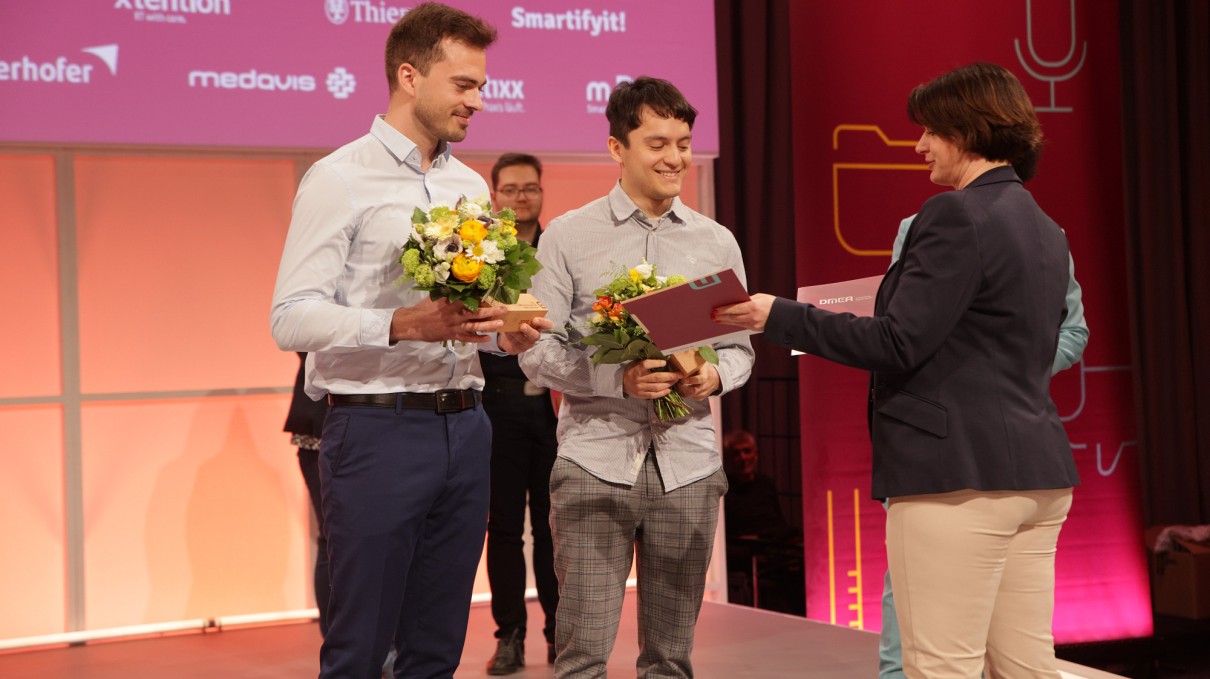Page content
Interview with DMEA Young Talent Award winners

Lars and Jonas won the DMEA Young Talent Award in the "Bachelor Thesis" category. Image: Messe Berlin
Lars Anderegg and Jonas Jiménez investigated how patients can be cared for just as well at home as in hospital and developed a patient@home concept for their bachelor's thesis. This concept won them the DMEA Young Talent Award in the "Bachelor Thesis" category. In this interview, they tell us what has happened since then.
Can you briefly describe your concept again?
"Our work, entitled 'patient@home - development of an IT architecture for the patient@home concept', is about transferring inpatient hospital stays of selected patients to their homes. There they are cared for by healthcare professionals and monitored at the same time with the help of sensors. It is important that all parties involved have access to treatment-relevant information. We have modeled the processes of patient@home treatment, developed an IT architecture and implemented a prototype in the medical informatics laboratory at Bern University of Applied Sciences. At the heart of the IT architecture is a dashboard through which the various service providers can exchange structured data."
Did you continue to work on the concept after winning in April?
"We didn't continue to work on this concept ourselves. However, during our bachelor's thesis, we closely supported a feasibility study on this topic by Spitalzentrum Biel. Together with the Bern University of Applied Sciences and various other project partners, Spitalzentrum Biel is continuing to work on this concept. The aim is to start a pilot project in which it can be shown whether the 'patient@home' concept also works in day-to-day operations."
How did you hear about the DMEA Young Talent Award?
"After successfully completing our Bachelor's thesis, our lecturers told us that we could submit our work for the DMEA Young Talent Award. Our lecturers told us about the DMEA in the first semester of our medical informatics course. Every year on this course has the opportunity to visit the DMEA once as part of a module, which was the case for us in the sixth semester. As our predecessors had already submitted work, we were already familiar with the DMEA Young Talent Award."
Did anything change for you after winning? Did you get any job offers?
Lars: "Immediately after the award ceremony, I got talking to a lot of people and was able to make some interesting contacts. Some of them told me that they were looking for medical informatics specialists. However, there was no concrete job offer and I already had a full-time position."
Jonas: "The experience of being in the spotlight in this way made me proud and I received a lot of positive feedback. I was also able to make lots of contacts and compare our concept idea with other ideas."
The DMEA Young Talent Award also includes prize money of 1,500 euros. Have you already invested the money?
Lars: "No, I haven't specifically invested the money in anything yet."
Jonas: "Not directly in the project itself, as I had already completed my studies at the time - but in culinary, horizon-broadening personal projects, aka recharging my batteries or traveling."
What advice would you give to students who are thinking about applying for the DMEA Young Talent Award?
"In our view, the most important thing is to enjoy the topic of the project work, to enjoy working on complex tasks and to be able to find practical solutions. Especially with innovative projects, it is worth putting in a little extra effort. We definitely recommend taking part, because at the end of the day: nothing ventured, nothing gained."
Students can still apply for the DMEA Young Talent Award 2024 until January 31, 2024. All information and the link to the application can be found here.


